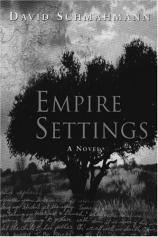Empire Settings
Review
Empire Settings
The strikingly cross-cultural blurbs on the jacket cover of EMPIRE
SETTINGS --- from Archbishop Desmond Tutu to Publishers
Weekly --- offer a good indication of the political scope of
David Schmahmann's debut novel about a forbidden love affair
between a privileged young white man and a young bi-racial woman in
South Africa under apartheid. But be not wary. This
Romeo-and-Juliet take on things is neither a soggy romance boasting
an appallingly naive understanding of apartheid nor a puppet
plotline, thinly veiling a tedious, politically correct
didacticism. Rather, in EMPIRE SETTINGS, Schmahmann makes the
political compellingly personal, and the personal powerfully,
inextricably political.
The Divins are a well-off, liberal, Jewish family, opposed to the
apartheid regime under which they live in Durban, South Africa ---
Helga, the mother, even runs for Parliament on the anti-apartheid
ticket, becoming a regular radical celebrity in the process. But
when 17 year-old Danny falls in love with Santi, the "coloured"
(mixed-race) daughter of a black servant, his parents are thrown
into a crisis of philosophy vs. parental concern. Ultimately,
Danny's father forces him to end the relationship with Santi. And
despite having promised Santi that they would find a way to work
things out, after a year of mandatory army services, Danny loses
contact with her all together.
Sick of witnessing the hateful, divisive politics of South Africa
destroy his relationship with Santi and his family --- his sister
Bridget is jailed on a spurious charge of consorting with a black
man; his father kills himself --- Danny decides he "simply [can't]
take it anymore." He leaves Durban and moves to Boston. On his
first day there he meets a free-spirited but caring young woman
named Tesseba who offers to marry him so that he may secure
American citizenship. He accepts, and twenty years later they are
still married, happy, but not completely so, as not a day passes
that Danny's thoughts do not turn to his long lost love.
In a poignant ironic twist, Helga --- whose once progressive
politics were imitated by Danny, causing him to fall for and lose
Santi, and then leave Durban --- persuades her son to return to
South Africa, now post-apartheid, in order to illegally smuggle out
the family money, a trip that ultimately leads Danny back to Santi.
It is in this new, still struggling, still fragmented South Africa
that Danny finally discovers where, and with whom, his home really
is.
Opting against the omniscient or even a single first-person
narrator in favor of multiple first-person accounts, Schmahmann has
Danny, Helga, Bridget, Baptie (the Divin's long-time servant) and
Santi each tell their own story in sequential chapters alternating
between the present and 20 years back. There are, of course,
several sides to the same stories and the occasional irony of one
character knowing things the other(s) didn't --- the fact that
Bridget and Baptie were the ones to tip off the father to Danny's
affair with Santi, while Danny assumed it was another servant who
had once seen them together, for example. These contradictions add
a multilayered complexity to the Divins's difficulties living in
and then out of South Africa and, perhaps more profoundly, to our
entire notion of apartheid.
At the same time, Helga, Bridget, Baptie and Santi's stories
sometimes impede Danny's --- and make no mistake, EMPIRE SETTINGS
is Danny's story. Though their personal narratives intersect with
his, they do so only tangentially, using Danny's tale of lost love
as a platform from which to jump into their own stories of loss,
love, regret, resentment, and sometimes even fond remembrances of
South Africa --- Helga, for instance, talks much about her radical
days, juxtaposing them to her now loveless second marriage to a
money-hungry racist. But the suggestion here is not that the
women's voices aren't sensitively rendered or don't ring true or
that their stories don't profoundly illuminate the heinousness of
apartheid. Their narratives are all these things, in fact each
woman alone could have a book devoted to her life and times ---
that's the criticism. The four other narratives often overpower
Danny's. The central focus of EMPIRE SETTINGS is Danny Divin's
battle with the poisonous past and his journey toward epiphany. It
is his personal dramas --- Santi, the money smuggling scheme ---
that lend the book tension and suspense. Yet, he exists only as a
point of reference throughout the entire middle section of the
book. By the time we return to Danny's story (he the first and the
last chapters), our interest in the resolution to his dramas has
waned and the climax winds up feeling a little
anti-climactic.
Still, EMPIRE SETTINGS is a deftly told novel of great emotional
depth and political sweep. By refracting one 20-year span through
five different mediums, Schmahmann often perfectly captures the
maddening, debilitating powerlessness of life under apartheid and
the disenfranchised, guilt-ridden, loneliness of life
post-apartheid. EMPIRE SETTINGS is an ambitious feat, at which
Schmahmann admirably succeeds.
Reviewed by Sarah Brennan on January 21, 2011
Empire Settings
- Publication Date: August 1, 2001
- Genres: Fiction
- Hardcover: 328 pages
- Publisher: White Pine Press
- ISBN-10: 1893996166
- ISBN-13: 9781893996168




